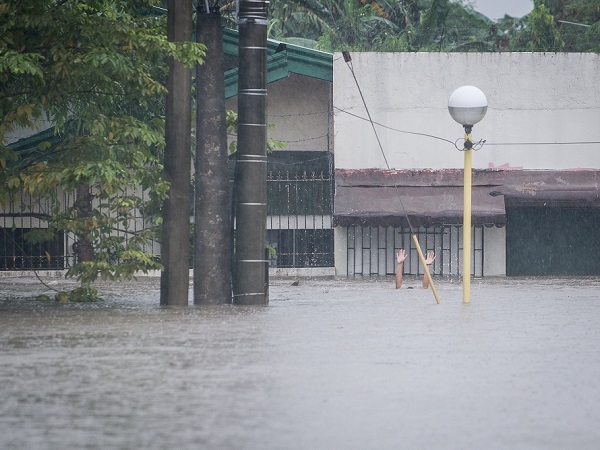
RAISE THE ROOF Floodwaters submerged houses in BF Resort Village in Las Pinas City after monsoon rains induced by tropical depression “Maring” caused the water level to rise in Metro Manila and nearby provinces Tuesday, Aug. 20, 2013. It was the second straight day of heavy rain, forcing the suspension of classes and work in government offices. JAIME T. CAMPOS/Contributed photo
MANILA, Philippines — Tropical storm “Maring” (international codename: Trami) continues to dump what is described as some of the heaviest rains in Metro Manila and nearby provinces, causing floods that have killed 8, turning roads into rivers and trapping people in homes and shelters.
In a press briefing Tuesday afternoon, Major Rey Balido, National Disaster Risk Reduction and Management Council (NDRRMC) spokesman, said one of the missing persons listed had been found, and was added to list of fatalities.
Schools, government offices suspended classes and work for a second day except for rescues and disaster response.
Financial markets were also closed because of torrential rain and floods.
The NDCC said that aside from the seven dead, 11 have been injured and four reported missing on the second day of the downpour induced by the southwest monsoon brought Maring.
The dead included a 5-year-old boy whose house was hit by a concrete wall that collapsed. His two adult relatives also were injured, the NDRRMC said.
The number of affected persons has also swelled to 600,000 throughout Luzon, it said.
There were also 602,442 persons affected in the regions of Ilocos, Cordillera, Central Luzon, Calabarzon, Mimaropa, National Capital Region. Most of the affected persons were at 408,742 persons.
There were also 65 roads impassable in the regions of Central Luzon, Calabarzon, Mimaropa and the National Capital Region.
Philippine Airlines (PAL) and Sea Air flights at the Ninoy Aquino International Airport (NAIA) have been cancelled due to the bad weather, according to NAIA General Manager Jose Angel Honrado.
All throughout the sprawling, low-lying capital region of 12 million people, floodwaters made most of the roads impassable and reached waist- or neck-deep along rivers and creeks.
Authorities opened 44 evacuation centers in Manila filled with tens of thousands of people, Social Welfare Secretary Corazon Soliman said.
The flooding followed two nights of heavy monsoon rains.
Maring hovered over the North Philippine Sea and drenched the main northern island of Luzon with up to 30 millimeters (just over an inch) of rain per hour. It was forecast to move away from the Philippines toward Taiwan on Wednesday.
In many coastal towns along swollen Lake Laguna, near Manila, and in food-growing riverside provinces, residents were trapped on rooftops, waded through the streets or drifted on makeshift rafts. Many chose to stay close to their homes for fear they would be looted if they leave. Floodwaters had subsided late Monday but the night of pounding rains Tuesday repeated the deluge.
Flooding has become more frequent in Manila because of deforestation of mountains, clogged waterways and canals where large squatter communities live, and poor urban planning.
According to an assessment from the Department of Science and Technology, rainfall reached 600 mm (23.62 inches) in and around Manila Bay on Sunday alone. That’s compared to the disastrous 2009 Typhoon “Ondoy” (Ketsana), the strongest cyclone to hit Manila in modern history with 455 millimeters of rain in 24 hours.
In the chilly northern mountain town of Sagada, army troops and police on Monday rescued 29 tourists, including 13 Japanese, who were stranded for several hours inside a cave after two days of heavy rains caused a stream at the entrance to swell, Office of Civil Defense official Andrew Alex Uy said. One Filipino tourist remained missing.
Several dams in Luzon were forced to open their flood gates because of rising waters and thousands of residents downstream were told to move.
The Philippine archipelago is among the most battered by storms in the world. About 20 tropical cyclones hit the country every year. With a report from AP
RELATED STORIES
7 dead as downpour continues
Floods paralyze capital for second straight day
List of class, gov’t office suspensions for Tuesday
Pantabangan Dam far from spilling level, not releasing water—report
1,000 families evacuated as La Mesa Dam spills water
Ship runs aground in Cebu; passengers safe–Coast Guard
‘Maring’ maintains speed, continues whipping up southwest monsoon
Pateros placed under state of calamity
700 families evacuated from Metro areas near rivers